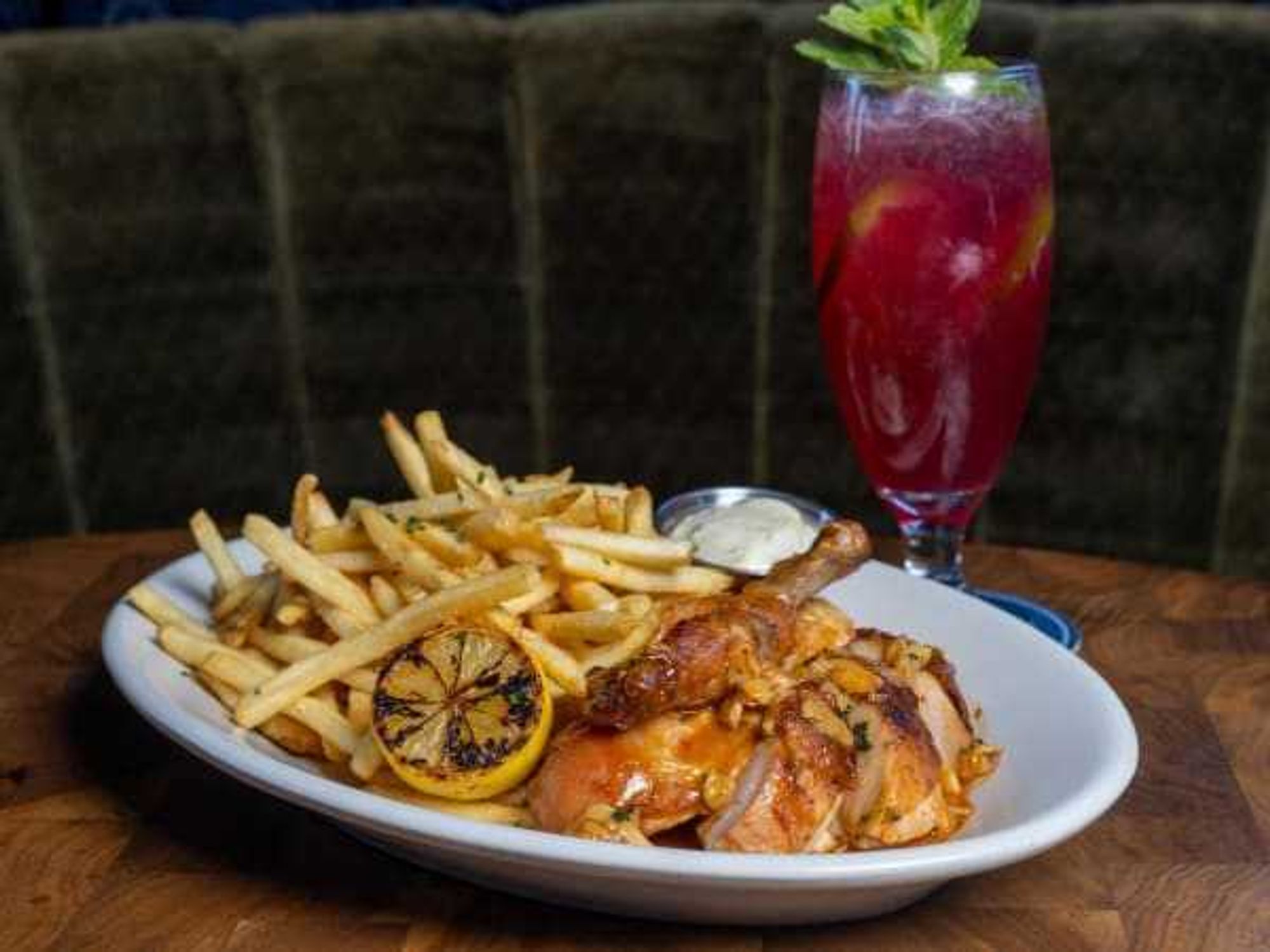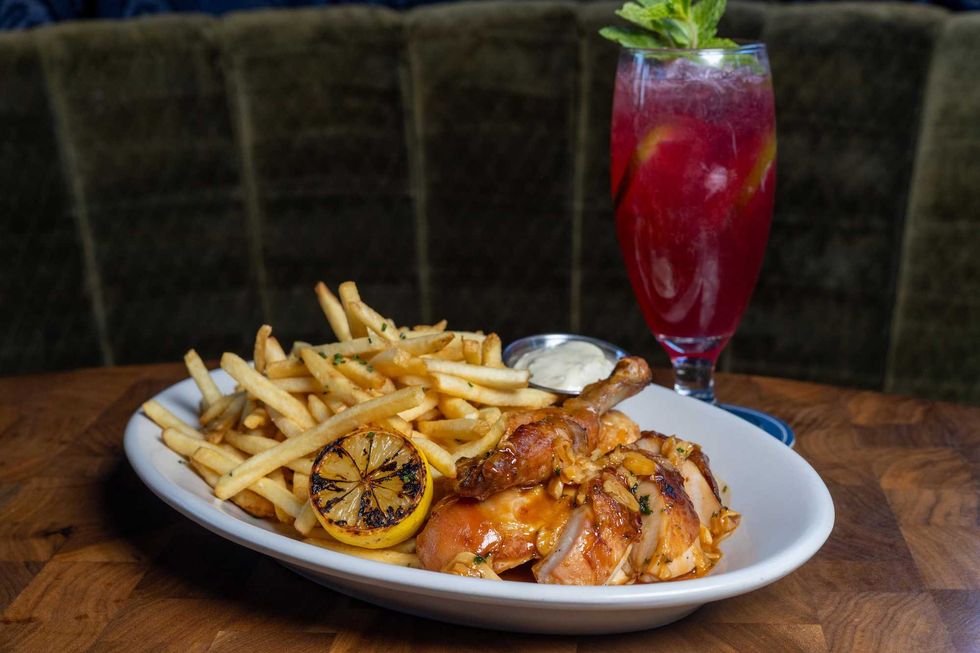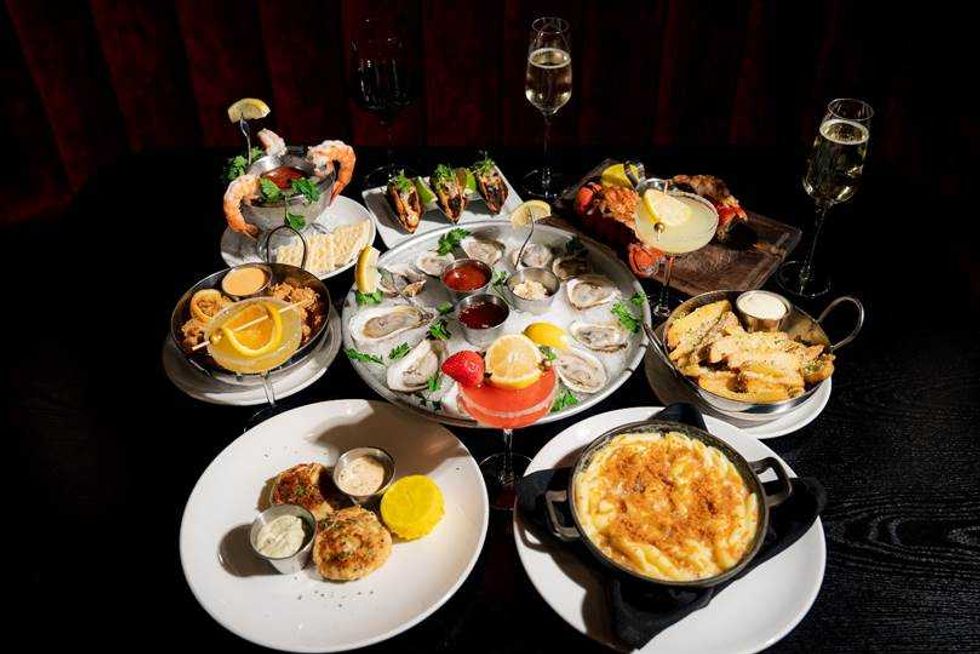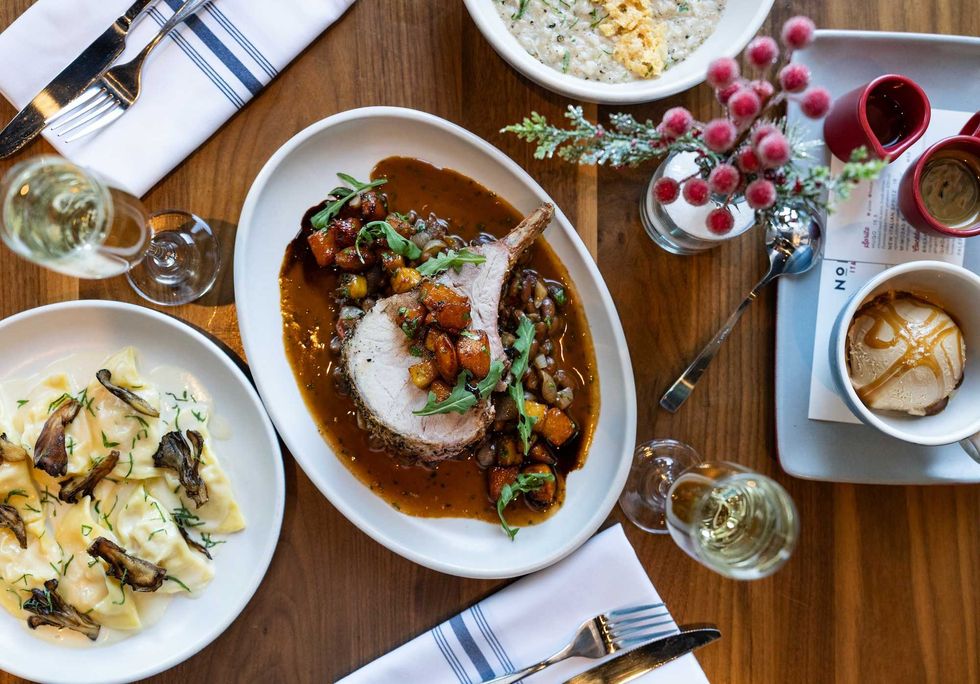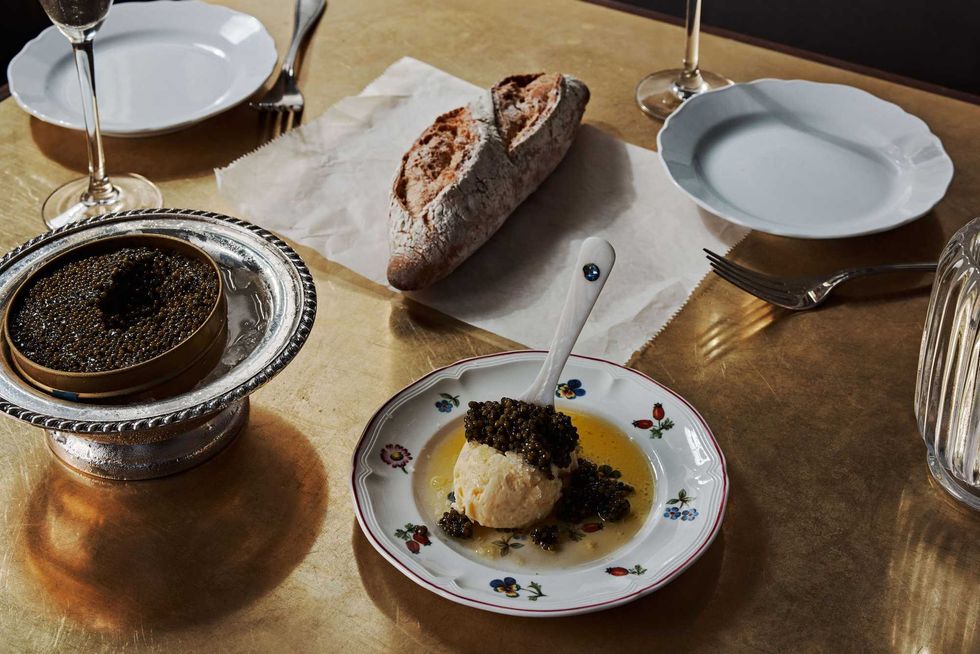Whether 2025 was great, awful, or just meh, there’s no reason not to end it on a high note. Houston restaurants are celebrating with indulgent menus featuring caviar, lobster, and steak, along with plenty of bubbly. Food and booze aren’t the only draws — many of these New Year’s Eve celebrations also bring DJs, live music, and even aerial performances into the mix.
Bari Ristorante
Life’s a circus at Cirque du Bari, the restaurant’s New Year’s Eve fete, where the adjoining lawn will be transformed into a whimsical experience complete with stilt walkers. A DJ will keep the atmosphere festive until 2 am, with patrons encouraged to “dress to join the circus.” Two dinner seatings are available from 7–7:30 pm and 9:30–10 pm, followed by a champagne toast at midnight.
Camaraderie
Find fan favorites and limited features on the menu at Camaraderie, such as roast muscovy duck breast in a cherry and foie gras jus, and a meringata with white truffle gelato and hazelnut praline. Reservations are required to snag this $98 per person curated menu. Seatings are available from 5 pm-10 pm.
Doc’s Jazz Club
Montrose’s new jazz club is sending off 2025 with 7 pm and 10 pm performances by Tianna Hall and the Houston Jazz Band. The four-course dinner opens with black-eyed pea soup and a grape-arugula salad, followed by a choice of stuffed pork tenderloin, 6-ounce Black Angus filet, or seared halibut. End on a sweet note with a spiced, red-wine poached pear and cinnamon whipped cream. The 7 pm seating includes a bubbly toast, while those at the 10 pm show will be served a full bottle of bubbles at midnight.
Eculent
There’s no reason to settle on just one restaurant for NYE, when you can visit all four of Chef David Skinner’s spots with a $99 “Ticket to Roam.” Patrons can move between eculent, ISHTIA, Meticulous Spirits Distillery, and Clear Creek Winery all in one night, with a hot buffet from 7–10 pm, a dessert bar from 10 pm-12 am, and champagne with party favors at midnight. Cocktails and wine will be available for purchase. The event is 21+ with reservations required.
Flora Mexican Kitchen
Toast to the new year at this Buffalo Bayou Park eatery where a live DJ will spin tracks from 8 pm-12 am, with complimentary champagne when the clock strikes midnight. A sparkling disco ball adds to the ambiance.
Guard and Grace
The luxurious downtown steakhouse will supplement its regular menu with NYE features, including dry-aged duck breast with foie gras dirty rice, bluefin tuna tataki, steamed crab and lobster wonton, pan-roasted Alaskan halibut, and smoked, bone-in beef short rib with black garlic glaze.
The Henry at Town & Country Village
One of Houston’s newest neighborhood restaurants invites diners to welcome 2026 with a three-course meal. Start with decadent bites such as the truffled brie toast, followed by entrees like a Korean prime skirt steak or roasted chicken frites. Dessert brings a chocolate fudge pie, lemon olive oil cake, or a molten butter cake. Priced at $85 per person, with optional wine pairings available as an add on. The Henry is open from 4 pm-12 am.
Juliet
Slip into the new year feeling like a spy at this James Bond-inspired, black-tie attire event. “Casino Royale” at Juliet is a $250-per-person celebration with casino-esque games, magicians, entertainment, open bar, and a three-course dinner. Standout dishes include a two-pound lobster thermidor and a 36-ounce tomahawk ribeye (+$150).
Kitchen Rumors
This fusion spot in the Arts District is marking New Year’s Eve with a $75 prix fixe menu of flavorful creations like roasted oyster tikka, shrimp ravioli, and beef vindaloo with basmati rice. The fifth and final course offers a choice between carrot halwa cheesecake or chocolate cardamom mousse. Kitchen Rumors is open from 4pm-10pm.
Little’s Oyster Bar
Seafood lovers will want to close out 2025 at Little’s Oyster Bar where features include Matagorda Pearl oysters on the half shell with champagne seafoam and Little’s white sturgeon caviar, Red Royal shrimp, lobster bisque, and Yellow Edge grouper. The fixed-price menu is $175 per person, served from 5 pm-10 pm.
Makiin
It’s “Midnight in Bangkok” at this Upper Kirby restaurant where live entertainment — like Thai dancers, aerial performance, and DJ — complement a $55, three-course menu. All diners can raise a complimentary pour at midnight. MaKiin is open until 12 am on December 31.
The Marigold Club
Goodnight Hospitality's decadent, Mayfair London-inspired French restaurant is celebrating New Year's Eve with a three-course, $175 per person prix fixe menu. Begin with choices such as beef tartare, tuna crudo, or Caesar salad. Entree choices include prime filet, duck Wellington, Dover sole, and lobster Thermidor. Four dessert choices complete the meal. Enhance the experience with additions such as caviar, truffles, and champagne.
Maximo
Executive chef Adrian Torres’ progressive Mexican cuisine is the star of Maximo’s NYE show. Smoked pork belly, masa cornbread with white truffle and caviar, and corn puree Basque cheesecake are just a few of the offerings on the five-course, $85 prix fixe menu. Add cocktail and wine pairings for an additional $45. Maximo will open at 5 pm on New Year’s Eve with a last seating at 10 pm, and return to regular service and menus on Thursday, January 1.
Milton’s
Say “Buon Anno” with a five-course feast at Milton’s. The curated dinner starts at $150 per person, with optional wine pairings available for $75. Find favorites such as the housemade sourdough tagliatelle with shaved black truffle, and a seafood risotto with poached lobster.
Murray’s Pizza and Wine
Raise a slice of pizza to the year’s end at this recently-opened pizzeria. The prix fixe menu features small plates and three limited-edition pizzas: caviar and with Norwegian salmon that's hot-smoked in house; duck confit pizza with roasted red grapes; and a truffle-wild mushroom pizza with a garlic cream sauce and salsa verde.
North Italia
Why not finish the year off with a sampling of new dishes? The restaurant’s three-course menu for NYE includes staples such as the Sicilian meatballs, alongside new creations like smoked prosciutto chicken parmesan and a lobster mezzaluna with tiger shrimp in a white vodka sauce. Pricing starts at $75 per diner.
Pappas Bros. Steakhouse
The Houston institution invites patrons to bid adieu to the year with a $150, four-course menu. Lobster deviled eggs, grilled double cut lamb chops, and “turtle” mousse tart are on the menu, as is the restaurant’s signature 16-ounce, prime ribeye. Both the Galleria and the downtown locations will host the celebration.
Sol 7 at the Thompson Hotel
Soar up to the seventh floor of the Thompson Hotel for Sol 7’s $70, three-course menu. Patrons can take in the restaurant’s downtown views while dishes of miniature crab cake with remoulade, a compressed melon carpaccio salad, and a red wine braised short rib are delivered to the table. A banana rum cake completes the meal. For those who want to continue the celebration, the hotel is offering a “Let’s Party” in-room decor package that includes a bottle of Veuve Clicquot.
State of Grace
Join chef Ryan Lachaine at this River Oaks-staple for a four-course, $145 per person dinner. Everyone starts with house baked bread, served with butter and caviar, before choosing one of five starters such as raw oysters, chili crab, or yellowfin tuna crudo. Entree options include char sui-style duck breast, mushroom risotto, prime filet, or dry-aged cote du boeuf ($49 supplement) and are paired with shared sides including black-eyed peas. Add wine pairings for $65 or $125.
Street to Kitchen
James Beard Award-winning chef Benchawan Jabthong Painter and her husband Graham Painter invite diners to join them for a surprise menu that features multiple courses showcasing "unapologetically Thai sweet, sour, salty, bitter, and spicy flavors." Priced at $100, the meal begins at 7 pm with a cocktail hour at 6 pm. Reserve seats via Street to Kitchen's website.
Succulent Fine Dining
The Regent Square restaurant is capping off its first year in Houston with music from DJ Sound and Vision and a seven-course prix fixe menu. From the $125 per person menu, expect entrees like a poached halibut cheek with butter-braised leeks, and a pepper-crusted, 1855 Farms prime rib. The regular dinner menu will also be available. Succulent Fine Dining is open from 5 pm-12 am.
Turner's Cut
Those looking to splurge may want to indulge in the seven-course tasting menu at this ultra-posh steakhouse in Autry Park. Priced at $2,026 per couple, it includes selections such as a caviar tartlet paired with champagne; lobster ravioli paired with more champagne; both an American wagyu strip and a Japanese wagyu filet; and a welcome cocktail made with Rémy Martin 1738. A toast with Louis XIII cognac ends the meal. Live music, party favors, and a midnight balloon drop complete the experience.
Uchi and Uchiko
New Year’s Eve is an intimate affair at Uchi, where diners can reserve a $400 omakase experience for two. Selections include Siberian caviar service, A5 wagyu gyutoro, and bluefin akami. The restaurant’s sister restaurant, Uchiko, is also offering an omakase for two at $350. The regular menu will be available at both restaurants on NYE, but no happy hour or to-go orders will be. Reservations are available from 4 pm-11 pm.
The Woodlands Resort
2025 is going out big in the ‘burbs with a 14-piece live band and a buffet-style dinner at the Woodlands Resort. The festivities kick off with a champagne welcome and passed appetizers, with a live DJ cranking out tunes before a confetti countdown at midnight. Tickets are $150 per person and can be purchased via Eventbrite. “Midnight Noir” at The Woodlands Resort is from 7 pm-1:30 am.
 Chef Aaron SanchezPhoto via PR Web.com
Chef Aaron SanchezPhoto via PR Web.com Shrimp grits
Shrimp grits Ahi salad
Ahi salad

